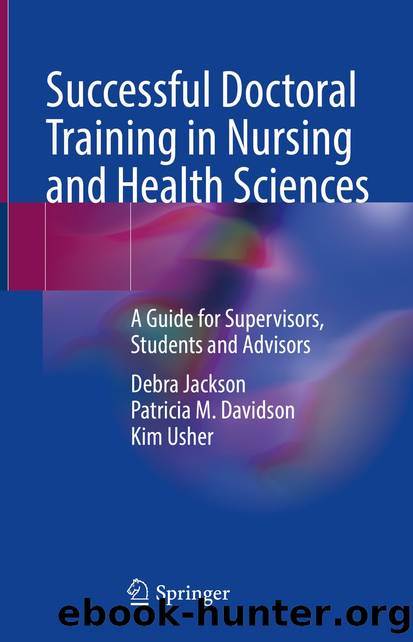Successful Doctoral Training in Nursing and Health Sciences by Debra Jackson & Patricia M. Davidson & Kim Usher

Author:Debra Jackson & Patricia M. Davidson & Kim Usher
Language: eng
Format: epub
ISBN: 9783030879464
Publisher: Springer International Publishing
Recognise the supervisor and student factors influencing how feedback is delivered and received
Understand feedback as a reciprocal, dynamic, and iterative process
5.1 The Importance of Feedback in Doctoral Supervision
Providing regular, quality, and constructive feedback is essential to effective supervision and to student progress, success, and growth; however, there is little discussion about feedback at the doctoral level. Research findings suggest wide interpretation of what constitutes appropriate feedback for doctoral students and highlights student feedback as an unproblematised and largely taken-for-granted aspect of doctoral supervision (Jackson et al. 2021). It is important to talk about feedback and its role in doctoral studies very early in the relationship with students and talk about the nature and purpose of feedback and feedback as a two-way street and explore preferred ways for individual students to receive feedback. Differences in perception around feedback are a common cause of dissatisfaction and frustration on the part of both students and supervisors.
Understanding and employing feedforward, defined as feedback that âdirects the author forward to the next level of developmentâ (Carter and Kumar 2016:76), can be very useful for students to guide future work and progress as they take the next steps forward. However, many students take the term feedback quite literally and negatively and consider it only in relation to work already done. This is where the importance of understanding the concept of feeding forward is so important . Comment on work in draft or already done provides a means of feeding forward and signposting issues to be carried into future work.
Ideally, in the context of doctoral training, feedback results in intellectual advancement, progression, and enhanced quality of the work. However, in reality, the process of feedback can be fraught and difficult (Jackson et al. 2021). In some situations, feedback (though provided with the aim of being helpful and constructive) results in students feeling disempowered and discouraged, therefore having the opposite effect to what was intended. When people feel criticised or critiqued, they can experience a range of emotions that can range between feeling intellectually challenged and personally offended (Jackson et al. 2009).
How the feedback is perceived is part of who we are and what we bring to the relationship. For some people, critique is hard to accept, and the emotion blocks the message that is being conveyed , meaning the student loses the value of what is being offered. The thing to remember with feedback is that it is not personal â feedback is offered as a way of encouraging deep learning and intellectual growth. It is a way of receiving information that can help with subsequent writing and research activities (Carter and Kumar 2016).
Download
This site does not store any files on its server. We only index and link to content provided by other sites. Please contact the content providers to delete copyright contents if any and email us, we'll remove relevant links or contents immediately.
Spare by Prince Harry The Duke of Sussex(5197)
Navigation and Map Reading by K Andrew(5158)
Tuesdays with Morrie by Mitch Albom(4784)
Machine Learning at Scale with H2O by Gregory Keys | David Whiting(4313)
Cracking the GRE Premium Edition with 6 Practice Tests, 2015 (Graduate School Test Preparation) by Princeton Review(4293)
Never by Ken Follett(3957)
Goodbye Paradise(3810)
What It Really Takes to Get Into Ivy League and Other Highly Selective Colleges by Hughes Chuck(3760)
Fairy Tale by Stephen King(3399)
Harry Potter and the Prisoner of Azkaban (Book 3) by J. K. Rowling(3360)
Pledged by Alexandra Robbins(3179)
Kick Ass in College: Highest Rated "How to Study in College" Book | 77 Ninja Study Skills Tips and Career Strategies | Motivational for College Students: A Guerrilla Guide to College Success by Fox Gunnar(3129)
Reminders of Him: A Novel by Colleen Hoover(3121)
A Dictionary of Sociology by Unknown(3085)
Sapiens and Homo Deus by Yuval Noah Harari(3071)
The Social Psychology of Inequality by Unknown(3031)
Graduate Admissions Essays, Fourth Edition: Write Your Way into the Graduate School of Your Choice (Graduate Admissions Essays: Write Your Way Into the) by Asher Donald(2922)
Will by Will Smith(2920)
Zero to Make by David Lang(2785)
